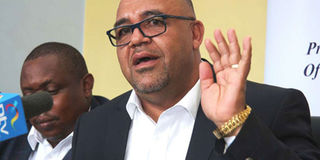Fare controls: Matatu operators ask for subsidies, consultation

Matatu Owners Association chair Simon Kimutai during a press briefing in Nairobi on October 24, 2017. PHOTO | KANYIRI WAHITO | NATION MEDIA GROUP
What you need to know:
- Matatu Owners Association (MOA) chairman Simon Kimutai explained that subsidies will improve the sector's growth by preventing further losses.
- The MOA boss further said Kenya is a liberalised market with no price controls and that as such, price changes should be left to the forces of demand and supply
- The association denied claims that operators were exploiting passengers, saying charges are based on supply and demand.
Matatu operators now want the government to offer subsidies and incentives to cushion them against losses before effecting its proposal to regulate fares.
They also want to be consulted on the matter, following the Transport ministry's drafting of the Traffic Act and the National Transport and Safety Authority (NTSA) Act, with the aim of introducing a regulation capping the fares.
However, Matatu Owners Association (MOA) chairman Simon Kimutai warned that capping fares "will slowly but surely kill a sector already making losses".
FREE MARKET
Mr Kimutai explained on Friday that subsidies will improve the sector's growth by preventing further losses.
“If you reduce the prices the sector will collapse, rendering most people jobless. The move to reduce prices is not welcome,” he added.
The MOA boss further said Kenya is a liberalised market with no price controls and that as such, price changes should be left to the forces of demand and supply
“Why try to strangle a free-market economy? We do not know the reason behind the re-introduction of the price controls but I sense mischief. All we are asking for is fairness and engagement of stakeholders,” he said, and reiterated that they will not allow the implementation of the regulation.
EXPLOITATION
Regarding the alleged exploitation of commuters through high fares, the association denied the claim, saying charges are based on supply and demand.
“I do not understand the reasoning behind the amendment ... no one gets into business to make losses,” the chair said.
Mr Kimutai also said that to prevent this exploitation, operators were ready to set minimum and maximum fares and have these displayed in charts in all vehicles.
“We have directed all PSVs to have charts of fares charged during peak and off-peak hours and to not to exaggerate fares especially when it rains,” said Mr Kimutai.
MINISTRY'S PLAN
The ministry of transport is seeking to amend Section 119 (1) of the Traffic Act by introducing a sub-section that will allow the Cabinet secretary to prescribe the regulation of PSV fare tariffs.
Once the amendment is effected, the minister will have the legal mandate to determine the formulae for establishing the tariff as well as review the mechanisms and the penalty for non-compliance.
The ministry also wants to amend section 4(2) of the NTSA by introducing a sub-section for the establishment of PSV fare tariffs.
Currently, there is no explicit provision that enables the authority to regulate fares under public transport laws.





